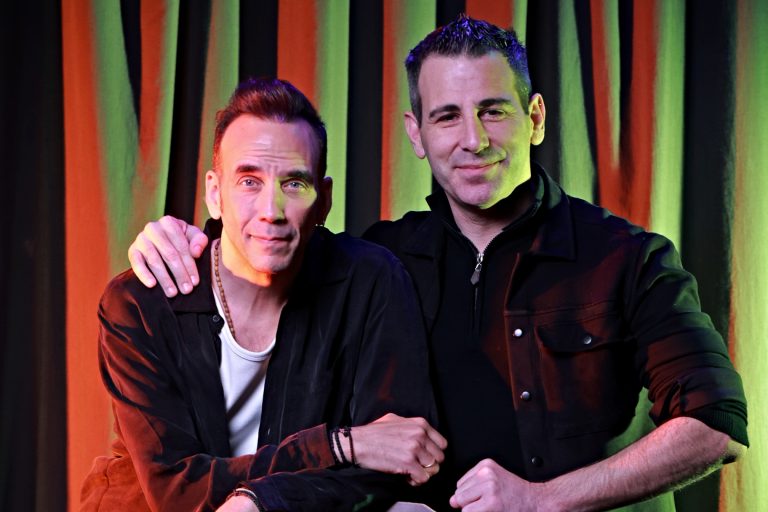George Arkomanis “Contemporary Music”
(The lecture of the composer that took place at “An Art”, during the conference “Music and Musicians”, on 16th-17th March 2013).
Nowadays (perhaps more than ever), a lot is being heard about “contemporary” music. A characterization perfectly adequate, which tends to transform into an abstract notion expressing both everything and nothing.
A cripple scholar, you would say!
That would not constitute a problem, if it represented a movement or even some era (like for instance, the Classic or the Romantic), since I am not of the opinion that a perfect descriptive ‘title’ can be found -and between you and me- it is of no importance.
But at this point, we have a semantic confusion and not only that! So, when the term ‘Contemporary music’ is mentioned, beyond its etymological essence, three words sound -almost clearly- in the common conscience: Modernism, radicalism and innovation.
Modernism was a movement born in the beginning of the 19th century, advocating the reaction against conservatism and tradition. This reaction, in fact, was social and utterly essential for its time.
It did not take long for the tentacles of the academism, though, to clench modernism enforcing every kind of restrictions and laws. Thus, the compulsion for anything innovative and completely different from what already existed began, with the definite prohibition of every element that flirted with the past.
A lobby, that is, which on the one hand objects to legal oppressions and on the other hand medievalizes around its enforced aspects about the contemporary!
Thus, the modern trends and streams that expressed the new and the different were later characterized as ‘radical’, reaching its golden era in the middle of the 20th century.
Radicalism and modernism had as a common denominator the element of ‘innovation’, which dominated ever since. Inevitably, many artists, turning their back at the regimental -now- reaction, found shelter in primitivist trends, trying (in some way) to reconsider and re-determine the evolution of things, through the pursuit of an impending truth, buried in the depths of time. A truth based on the instinctive concerns of the ancestral humanity, unspoilt from the cosmopolitan world as well as the philosophical dead ends of the western world. Primitivism therefore stood at the bank opposite modernism, having as a result its respective stabilization.
By that way, more or less, the gap between the main streams were created, which constitute the maternal points of the majority of the contemporary music thought.
A thought that conceals a constant game of conquests, idealizing it as ideology, whereas in fact it covers the mass and herd’s needs. One kind of academism dominates the other.
“The academism of petrified realistic means is removed from the academism of more petrified archaic means and this academism in turn is removed by a more modern one, and so on and so forth’. In each of them lies the serious hazard of abolition of the artistic truth! Like the whole problem is between regressive conservatism of the traditional values or the degradation of every human reminder of modernism!
On the one hand, modern (as itself) dies from the self-determination as modern, since the term indicates something ephemeral.
Therefore, either it is something ephemeral, or it becomes a caricature in its effort to invent new ways of innovation as resuscitation. On the other hand, tradition rests in its laurels, forgetting inhumanely that everything it advocates was once contemporary and innovative. We have reached the childish point of the creation of a conflict between ‘old’ and ‘new’. And it is indeed a hilarious one, since the ‘old’ was once ‘new’ and the ‘new’ (at best) will become ‘old’. Moreover, the ‘new’ cannot exist without the ‘old’ and many times it thinks it will, it just exists as a reaction to it. Respectively, the ‘old’ cannot exist without the ‘new’, since that way it will not exist itself!
What is basically hidden behind all these, is the incurable ‘flu’ of extreme opinions. And it is not at all coincidental since all extreme opinions pose easy argumentative tricks to persuade their fans that their opinion is the correct one.

And then relieved, they lie in their sofa of complaints and idleness. There, where (at least for them) the security of irresponsibility exists. Music innovation is a totally natural phenomenon within the limits of a healthy (if we can assume that) evolution of art. At its roots, there is either the refreshing need or the reaction. Thus in the past, the composers innovated either because they sought for a new way of expression or because they rebelled. Rebellions against church, aristocracy, etc. were in fact, rebellions against their musical and aesthetic features which they ‘fostered’ them in any way.
From the middle of the 20th century, in many countries, rebellion (especially the verbal one) became an easy case, since industries realized quickly that the image of ‘belligerent’ is highly commercial. Thus, this trend was disdained and contemporary art acquired (after academism) a huge enemy: the pop concept of ‘contemporary’, that let itself at the so called ‘fashion’ and became then the stock market of art attaching to it a consumeristic value.
Fashion is a synonym of temporary and the main force at the gears of capitalism. Everything comes and goes in rapid speed, so that the urban people are permanently trapped in the consumerism misery, they don’t think and they are manipulated easily. That’s why, fashion is not interested in the now, aesthetically. It is only interested in the yesterday and the tomorrow (of course only in the surface, based always in politics and the tricks of total distortion).
And in depth, there is nothing more than elements of ostentatious ness and vanity of the superior trend of the sad inferiority.
Imagine that conferences take place, where each trend is enforced! They decide and they instruct their fans how they should express themselves until the next conference, where a totally different aesthetic criterion can be enforced.
So, my friends, if that does not constitute a distortion of the human intelligence, what does? Everywhere they look, even in the so called ‘alternative’ styles, they will find adhering the respective fashions and attitudes. From that moment on, everything seems like innovation as they present the weird and the strange, finding fertile ground in the human naivety and confrontational fear towards the ‘unknown’.
Are we perhaps in the position to realize the importance of the work? And if yes, let’s wonder for a minute; What part of what we characterize ‘modern’, ‘radical’ and ‘innovative’ does it belong to our days? Perhaps we have to admit -at some point- that our legs are made for walking, not our arms or our nose and on the other hand there is no reason to go back to crawling. It’s time, I think, art did its biggest revolution, which is no other than the revolution against the idea of the revolution itself.
All the major composers were contemporary and innovative. Their work was directly connected to the society and if we focus on that, we will see the marks of tradition, which exists always either noticeably or unnoticeably, even in the birth of belligerent streams. Consequently, music and society are communicating vessels with anything that they contain (even with the elements of fantasy and supernatural that are of vital importance).
Since the 20th century, a trend of rejection of any kind of human element is observed , which from the beginning offers food for thought, but subsequently it becomes a dysfunctional state within a state, that snubs everything. Using quarrelsome language, it attaches philosophical qualities even in the most insignificant, whereas on the other hand it fritters the major human achievements of the past.
Every ideological stream has a tendency to destruction, through stability, debilitation, escalation and deformation. One brings the other, of course, and not necessarily with the abovementioned order. What remains in the end is either the meaning it had, has or will at some point have, or how much it helped (even in absentia) in the pursuit of another meaning.
So, we see that ideas are not responsible (but in majority they hide indisputable social elements), but the human horde which castrates every being in its effort to tame everything, making it harmless!
It fights with frenzy to define the ‘being’ and the ‘being not’, while in fact everything is ‘being’! Those which are ‘being’ more, are those which don’t try to ‘being’. Thus, it puts every notion in the microscope, it demarcates it and it attributes rules and attitudes, transforming it to a dogma. Consequently, the ‘faithful’, avoiding responsibilities, have ready models of systems and ideologies to cover the synthetic distance and also ready community, not only to address but also to accept effortlessly. In some minority groups the feeling of uniqueness is cultivated. We have heard many times about composers who are ahead of their times. In fact, I am afraid that, whether they stay behind it or they stay in ‘nowhere’. All these, unfortunately, rest the human being, offering delusional defenses, distracting it from any kind of social and spiritual fight.
It is not at all coincidental that although the unbelievable evolution of the composing processes, the composers themselves (in the majority) have chosen their duties to end at the writing of the score.
Why not then, at the sound of the play? Because paper offers many guarantees concerning the live performance that is accompanied sometimes by unpleasant situations, like for example, agoraphobia, judgment or even a failed performance. This abstention has degenerated the music act.
Just wonder:
To how many concerts of ‘contemporary’ music have you been and how many of them had the plays well-performed?
The lack of attention and faith! The faith to the artistic fight and not the involvement of our selfishness to it.
That’s why we should not indulge in the pointless purpose of a personal stigma. The vanity of the stigma leads to a delusion where the artist ends passive to hunt its tail to an autistic pursuit of identity which is nothing else than the proof of its lack! All the spiritual elements of knowledge acquire value only in the pursuit of ‘truth’ and not in the pointless fulfillment of a morbid narcissism. I believe this should be the unique artistic ambition.
Through a variety of philosophies, values, ideas we should express -not what manipulates- but what the reality demands, like our personal entirety realizes it, and is therefore unique.
If we are faithful to it in a way that does not enhance the psychological lacks but brings it a step closer to selfless pursuits, then our own personality produces a real, unique and innovative work. The forms, styles and systems should not be anything more than colors in our composing palette.
You see, the biggest enemy, in the end, not only of the contemporary music but of everything, is the close mind!
To fight it needs a lot of attention since we have to fight it effectively but also to take care if the fighting insistence on our opinions, transform us to close-minded. And in my opinion, this is the world’s problem right now! We swear and fight our partner, then he fights his partner, and his partner again fights us! And it does not cross our minds that we are all parts of this relentless chain.
Today, for the first time in history, we have the luxury to listen to any kind of music work, to study any philosophical trend, to learn any cultural tradition, to find sophisticated jobs for any aspect of technical knowledge and generally to contact the unprecedented knowledge (with anything negative it comes with).
This knowledge can teach us one thing only:
Every important theory and work constitute a carousel of human legacy so it should not be disdained, even if in the surface they have faded. That happened because one thought leads to another and moreover (especially in aesthetic matters) the thought which is important today is ostensibly insignificant tomorrow and again important the next day. So, everything is current even during their alleged absence.
What our time teaches us -thus- is that the biggest mistake we could do is to talk with dogmatism, which constitutes the death of every idea. Everything is wonderfully fluid! Don’t forget that the most important question, which is the light of every real truth, slips our minds.
The meaning of life!
So, the only thing that remains is the road, the journey, the pursuit, the fight! And all these came true only through the new. Every composer is expected to be new. And new is that who maintains his spirit fresh and uncomfortable, preserving -at the same time- (with a healthy way) the life’s educational experiences.
Furthermore, every composer is expected to be human! And every human should be contemporary to constitute a healthy and functional unit in the social whole.
And contemporary (finally) is that who listens to his time bearing – always- in mind the yesterday, the today, but also the tomorrow.
Thank you!


